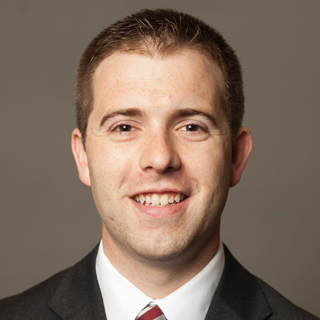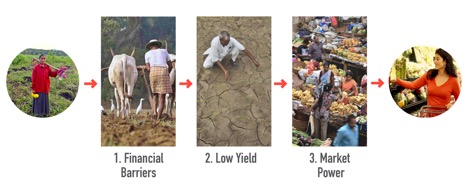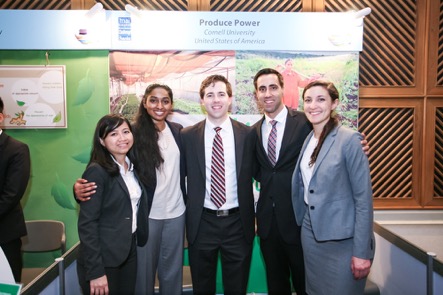One Week in Bangkok
The 2016 Mai Bangkok Business Challenge.

The 2016 Mai Bangkok Business Challenge.
by Jeremy Kuhre, MBA ’16, EMI Fellow
“I’ll tell you what. I’ll offer you $300,000 for 50% of the company right now.”
My partners and I were pitching our company, Produce Power, live on national television, and in this moment, I knew what it felt like to be an entrepreneur on Shark Tank. However, our potential investors weren’t Mark Cuban or Mr. Wonderful. Nor were we pitching our company in the United States. Heck, our company wouldn’t even operate in the western hemisphere.
My business partners and I had been invited to compete as semi-finalists in the international entrepreneurial competition, the Mai Bangkok Business Challenge. The week-long competition was held at the Sasin Graduate Institute of Business Administration of Chulalongkorn University in Bangkok, Thailand. It was created in 2002 to encourage and support MBA entrepreneurs interested in sustainable development. Win or lose, teams will interact with subject matter experts, impact investors, and other entrepreneurs from all over the world. I will get back to the Shark Tank moment shortly, but first, let’s discuss the business idea that brought us to Bangkok in the first place.

India’s economic growth over that past decade has resulted in greater consumer demand among affluent residents of urban centers for local, fresh produce. Demand for contract farming is growing as large supermarket chains are seeking to secure produce directly from growers. However, due to India’s highly fragmented agricultural sector, retail grocers are finding it difficult to secure a reliable supply of local, fresh produce. One need look no further than India’s smallholder farmer to understand the intractability of this problem: India’s smallholder farmers (those owning less than two hectares of farmland) comprise 78 percent of the country’s farmers.[1] Based on our research, these farmers face three primary barriers to accessing this attractive market (see graphic below):
- Constrained credit
- Constrained crop yields
- Constrained market power

Any model that attempts to link smallholder farmers to retail grocers must address all three constraints simultaneously and holistically. What’s more, in order to realize the scale necessary to achieve real impact, we knew that the model must generate significant profits. But we were up for the challenge. Produce Power addresses these problems through the provision of solar-PV greenhouses with accompanying pumping and drip-irrigation. The combined effect of these technologies result in many advantages over traditional farming including a 5-10x increase in crop yields.[2] Equipment is paid for via a profit-sharing agreement that requires few out-of-pocket expenses from farmers. Finally, Produce Power increases its farmer partners’ market power by aggregating output of its scaled operations to secure high-value off-taker contracts with retail grocers.
In November 2015, Produce Power’s founder, Vincent Kapur (MBA ’17), had been developing this concept with our Indian partners for six months. Due to the success of Cornell’s team in 2015 (Uma Bioseed went on to win $500,000 after taking first in Bangkok), there was considerable interest in returning to the mai Bangkok Business Challenge. The final team consisted of Vincent, Holly Pham (MBA ’17), Kat Leonetti (MBA ’17), Meghana Reddy (MBA ’17), and me (MBA ’16). Over the next few months, the team worked tirelessly to develop a robust business plan and pitch deck for use in the competition. Which brings us back to our pitch on live national television.
Only six finalists remained, ranging from Wajarra Studios, a cloud-based educational tool from Queensland University of Technology in Australia, to Green Earth Recycling, an e-waste recycler from ESSEC Business School in France. In the end, Animosa, a feminine hygiene disposal system from the University of Oregon, took first place. Our team fared well achieving finalist status in the general competition and runner-up for the Sustainability Award. We received many offers from judges and experts to introduce us to investors focused on food supply chain logistics in India and other emerging markets. Produce Power continues to pursue avenues to launch our business, with ongoing discussions across Cornell’s campus to leverage the best resources of the university and its affiliates.

Somewhere between accepting our awards from a member of the royal household of Thailand and receiving an extended Thai massage, I realized this competition ranked among the most exciting, educational, and memorable learning opportunities I have experienced at Cornell. Here’s to hoping that this is the beginning of a long Cornell tradition!
Produce Power would like to thank the generous organizations who provided monetary and moral support including Johnson Student Council, the Cornell Energy Club, the Sustainable Global Enterprise Club, the Cañizares Fund and the Emerging Markets Institute (all five team members are EMI Fellows).
[1] Food and Agriculture Organization of the United Nations
[2] http://iasvn.org/en/upload/files/J32EW1BWK4study_on_vegetable_0603135428.pdf
